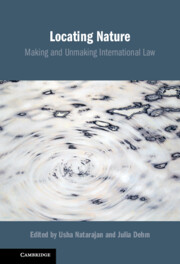Book contents
- Locating Nature
- Locating Nature
- Copyright page
- Contents
- Contributors
- Foreword
- Acknowledgements
- Introduction: Where Is the Environment?
- Part I Locating Nature in International Law
- Part II Unmaking International Law
- 4 Appropriating Nature
- 5 Reflections on a Political Ecology of Sovereignty
- 6 The Maps of International Law
- 7 Denaturalising the Concept of Territory in International Law
- 8 Who Do We Think We Are?
- 9 Law, Labour and Landscape in a Just Transition
- Part III Alternatives and Remakings
- Index
5 - Reflections on a Political Ecology of Sovereignty
Engaging International Law and ‘the Map’
from Part II - Unmaking International Law
Published online by Cambridge University Press: 22 September 2022
- Locating Nature
- Locating Nature
- Copyright page
- Contents
- Contributors
- Foreword
- Acknowledgements
- Introduction: Where Is the Environment?
- Part I Locating Nature in International Law
- Part II Unmaking International Law
- 4 Appropriating Nature
- 5 Reflections on a Political Ecology of Sovereignty
- 6 The Maps of International Law
- 7 Denaturalising the Concept of Territory in International Law
- 8 Who Do We Think We Are?
- 9 Law, Labour and Landscape in a Just Transition
- Part III Alternatives and Remakings
- Index
Summary
This chapter examines the relationships between representations and operations of sovereignty in natural resource governance. We advance a ‘political ecology of sovereignty’, examining the participation of non-state actors in resource governance processes. We particularly argue that processes of integrating subaltern populations through mapping local ecological knowledge can modify effective governance practices while nonetheless reproducing the legibility of state sovereign authority and its territorial boundaries. Exploring the Enbridge Northern Gateway pipeline in Canada, we suggest that state jurisdictional authority is secured through incorporating Indigenous interests as a delimited geography of tradition. Examining the Hatgyi hydroelectric development along the Thai–Myanmar border, we argue that the territorial boundaries of those nation-states are rearticulated through the governance of this transboundary development. Through these cases, we demonstrate how the insertion of local knowledge works not only to reconfigure effective governance processes but also to reinforce the effect of state sovereignty in new ways.
Keywords
- Type
- Chapter
- Information
- Locating NatureMaking and Unmaking International Law, pp. 134 - 158Publisher: Cambridge University PressPrint publication year: 2022

